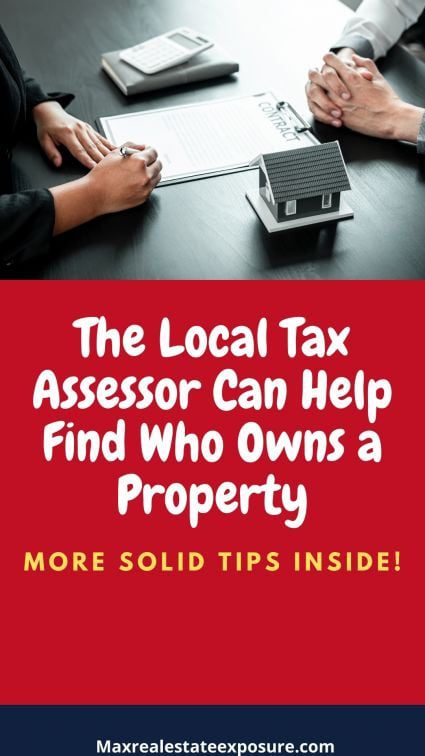What to Know About Doing an Owner Search of Properties

If you’re aiming to unravel the mystery of a specific type of property ownership, you’ve got a lot ahead of you.
You might wonder, “How to Find Out Who Owns a House?”
There might be various reasons compelling your search – perhaps neighborhood concerns, potential investment opportunities, or unresolved property issues.
Countless people perform property ownership searches, looking for results that reveal the owners of homes they’re interested in, regardless of the reasons behind their queries.
Perhaps you want to purchase an abandoned or waterfront house that has captured your fancy. Or, you may need to contact the owner of a house in your neighborhood due to some local issues, or you’re just curious.
A real estate investor would need to know how to find out who owns a house to turn a potential lead into a profit, for example. This inquiry type, “Who owns this property,” is not unusual in real estate discussions.
It can happen quite often. Real Estate investors are constantly looking for off-market properties to purchase.
Companies like “We Buy Houses” and “We Buy Ugly Houses” often score some of their best deals by finding off-market sales.
Maybe you heard the property might be heading to foreclosure due to the owner missing some mortgage payments.
Whatever your reasons, there are many methods for finding a house’s owner. Let’s look at all the ways you can see who owns a specific property.
Where to Begin Your Property Search
Understanding how to find the property owner will save you much time with research.
Some sources will be excellent places to continue your real estate due diligence.
In most parts of the country, you should be able to research information about home ownership online, either for a small fee or even for free. The information offered and the method to get it differs significantly between states.
If you don’t know where to look, there is an online public record tool on the NetROnline.com website. The site gives you information about where publicly available property data can be found for your area and should show you the likely costs involved in your search.
If the information isn’t offered online, they will provide the address details of the office you must contact.
Sometimes, homeowners can view these records for free, while everyone else has to pay. And in some other locations, ownership information isn’t available online.
You should check a few places to discover what information is available in your state. Let’s take a look.
The County Assessor Can Help Determine Property Owners
One of the best places to try when you want to know how to locate a property owner is heading to city hall. You can kill two birds with one stone and start your search for the property history.
This government office can go by a few different names depending on the state you are in. It is sometimes known as a land registry, property records, land records, or tax assessor.
To find the webpage for this service in your area, go to your local government website. Look around or search for some of the terms we’ve suggested.
Some information should be available online unless you live in a mainly rural area, with less chance of these records being accessible.
You will also determine previous ownership of a home beyond the current owner.
The Tax Assessor or Collections Office Provides Owner Search of Property
 Another way to determine who owns a home is to check who pays its tax assessment.
Another way to determine who owns a home is to check who pays its tax assessment.
The tax assessor’s office should have information on the ownership of the house. The best way to find the report is to have the clerk in the office pull the data card.
The public records will often contain contact information, including the current street name of the owner and possibly phone numbers to contact them.
You can also visit the official website for information about the last assessment.
In the online database, it might also be possible to see if there are any tax liens on the property, property values, and information on the home’s dimensions.
It should also have contact details for the owner, such as the mailing address to reach them.
Unfortunately, this information isn’t available online for every county, but you can take a trip to the tax office in person to get the property tax records instead.
The tax bill often contains information to help your property ownership search.
Speaking with the county tax assessor should help if you are unsure about the data.
The County Recorder or Recorder’s Office Can Show Prior Owners
The recorder of deeds is known as the county recorder or recorder’s office, and they hold copies of property deeds. Sometimes, depending on your jurisdiction, the county or court clerk takes care of these functions.
Most counties should have easy-to-use official websites for the county recorder. The information from this website should be accessible in most cases, though sometimes there can be a small fee.
You should be able to see a copy of the deeds for the property you are interested in, showing the person who signed the documents.
This is particularly useful if the property ownership belongs to an LLC and you are otherwise finding it difficult to determine who the owner is.
The Title Company Knows Who Has Owned a House
If you’re having trouble finding any information about the owner, you can approach a title company to help. They should be able to track down the title holder and provide you with any information about tax liens on the property.
There is a big downside with this, however: the cost. Using the services of a title company could cost you hundreds of dollars.
So, help from one of the larger title companies is only justifiable in a few circumstances. Utilizing a title company would be a last resort in your owner’s search for a property.
Real Estate Agents Can Help Determine Owners Of Property
 One of the easiest ways to assist in knowing who owns a property is by speaking to a Realtor. A great buyer’s agent can be your private investigator for property owner information.
One of the easiest ways to assist in knowing who owns a property is by speaking to a Realtor. A great buyer’s agent can be your private investigator for property owner information.
If you’re interested in purchasing the home, the agent would be in a perfect position to help provide information. They may have already researched the records to find the owner to offer their services to them.
Real Estate agents also have access to an online database known as the multiple listing service that contains property ownership information.
The MLS offers a ton of helpful information, including the owner’s name, the property address, the square footage, the assessed value, previous owners, and other ownership data, like when it was last sold.
It is usually easy to do with MLS access if you want to determine who owns a house.
The agent probably will also have access to parcel maps, which come in handy when researching property data.
Utilizing the services of a professional real estate agent is one of the best ways to find out who owns a property for free.
Real Estate Attorneys Can Also Assist In Researching Owners
A real estate attorney can be another valuable source of finding who owns a particular residential property. Attorneys can research legal documents to determine an owner’s name.
Real Estate attorneys can also look up the deed book and page to find housing info.
Armed with this information, they see the legal description. Real Estate attorneys routinely visit the registry of deeds and can access information you might not otherwise find.
They can easily search for an owner of the property when they are in the local registry.
Knock on The Door to Discover Ownership of a Property
When you don’t want to involve a real estate agent or an attorney, visiting the house is one of the most straightforward ways of finding a property owner.
The owner might not live there, but whoever is in the home likely knows how to reach the homeowner. If nobody is home, you can always leave a note with your contact information and the purpose for reaching out.
Try The Neighbors, Too
You can try doing the same thing with the neighbors as well. The owner may have given their contact information to the neighbor in case someone is trying to reach them.
Customized Mailing Lists Can Help Locate Property Ownership
Did you know some companies will provide mailing lists based on the custom data you provide them? Real Estate investors often order customized mailing lists to mass market to potential sellers.
Besides providing the property owner’s name, some companies might also offer email addresses and telephone numbers. These mailing list companies can often customize a list of contacts in the United States based on your parameters.
For example, you might want to find potential foreclosure homes or look for an absentee owner living in another state. They can often provide detailed information to help narrow down your search.
Look For Suppressed Property Ownership Information
Though unusual, the proprietor sometimes asks for their information to be suppressed. Hiding contact information can happen if the owner is concerned about their privacy.
Perhaps they are a witness protection program, but whatever the reason, they might not be happy that someone is looking into their business. Your best action might be to contact a lawyer to help learn home ownership in these circumstances.
Websites to Find Property Owners Online
 There are quite a few websites that will allow you to discover the name of the owner of a house you’re researching. Homeownership lookup becomes easier by trying these sites. You can find a property owner for free with most of these sites.
There are quite a few websites that will allow you to discover the name of the owner of a house you’re researching. Homeownership lookup becomes easier by trying these sites. You can find a property owner for free with most of these sites.
US Realty Records For Property Ownership Searches
US Realty Records – is an excellent site for establishing the current titleholder of a home. The company provides public access to official records for property data in the United States.
A simple online search gives you access to much information, including the owner’s name, mortgage, and sale history.
Property Shark Provides Owners
Property Shark – with Property Shark, uncover who owns any home in the US, along with access to comprehensive property data.
It’s an excellent site for real estate investors to determine who owns a home. The site lists records of property ownership.
You can do an ownership search on
Property Radar For Ownership Searches
Property Radar – Besides residential searches, property radar allows you to search
Melissa Lookups Finds Property Owners
Melissa Lookups can be found on the Google Play store. They provide detailed information such as the owner’s name, current residents, square footage, assessed value, property taxes, and other data points.
Nationwide Environmental Title Research
Nationwide Environmental Title Research – as previously mentioned, NETR is a public portal to research how to learn who owns a house. Using the site, it will be possible to uncover public documents on deeds, assessment data, tax info, mortgages, parcel maps, and more.
Searchbug Helps Locate Homeowners With PO Boxes
Searchbug – sometimes, it is harder to locate an owner when they only use a PO box for their address. The site lets you find a residential address from a PO box number.
With the help of Searchbug, you can locate a property owner’s name.
The Information Needed to Search for a Property Owner
If you have the property’s address, this should be enough information. The parcel number of the land can also be used to search. If you don’t have either of these details because you don’t have the full address, it’s typically possible to do a partial search in these databases.
In a situation like this, it is usually best to narrow your search as much as possible to save time. There’s no point in spending hours trawling through the records when you can cut down on the number of potential homes it could be.
Google Street View can often help with this; it allows you to search the residence and the street for more information about the home.
You can check the numbers on neighboring homes to determine the number of homes you want.
How to Find Out Who Owns a Rental
All the tactics we have discussed can be used to learn the owner of a rental property. It is likely the tenants also have the contact information for the landlord.
Final Thoughts on Finding Out Who Owns a Home
If you need to know the ownership of a specific residence, you may be surprised at the options available. You can get the information online for free in many areas, though it might not be as easy as that in many cases.
There are laws in some states that prevent the disclosure of ownership information. If you have such a problem, the only option is to order a formal title search to reveal these details.
Hopefully, you have learned quite a bit and now understand how to research an owner. If you want to find out who owns a property in Massachusetts, I can try to lend a hand. Feel free to reach out.
About the Author: The above Real Estate information on how to find the owner of a property was provided by Bill Gassett, a Nationally recognized leader in his field. Bill has expertise in mortgages, financing, moving, home improvement, and general real estate.
Learn more about Bill Gassett and the publications he has been featured in. Bill can be reached via email at billgassett@remaxexec.com or by phone at 508-625-0191. Bill has helped people move in and out of Metrowest towns for the last 37+ years.
Are you thinking of selling your home? I am passionate about real estate and love sharing my marketing expertise!
I service Real Estate Sales in the following Metrowest MA towns: Ashland, Bellingham, Douglas, Framingham, Franklin, Grafton, Holliston, Hopkinton, Hopedale, Medway, Mendon, Milford, Millbury, Millville, Natick, Northborough, Northbridge, Shrewsbury, Southborough, Sutton, Wayland, Westborough, Whitinsville, Worcester, Upton, and Uxbridge MA.

